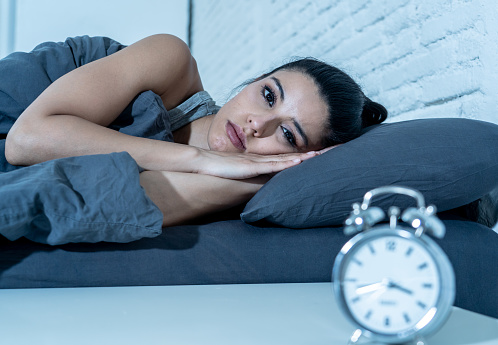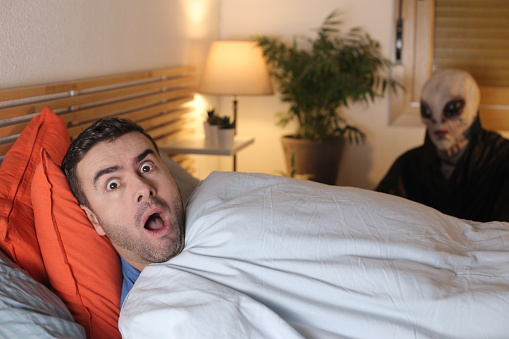The Science behind your Sleep Habit.
I heard a story of a young man who regularly sleepwalks, he wakes up in the middle of the night and just walks around, then walks back to his bed to sleep, when he wakes up the following morning he denies ever getting engaged in such activity while sleeping. On a faithful night, his neighbor looked through the window and found him walking down the stairs down to the street, being aware of how unsafe the community could be at that time of the night, he quickly alerted his friend, and together, they carried him back into the room and laid him on the bed.
To the surprise of everyone, this young man got up from the bed and opened the door for the second time attempting to walk down to the street once again with sleepy eyes, his neighbors decided to lock him up in the room in order to avoid any form of a sad story, but this sleepy young man kept on banging on the door, he attempted to pull down the door and got himself injured in the process before going back to sleep.
When it was daybreak, the neighbors woke him and told him all that transpired during the night and this young man could not believe it, he was almost arguing about doing anything like that until he was shown video evidence to support his actions.
There are moments in life when we meet certain people who have weird sleeping habits, for some it may be a constant habit of sleeping for extremely long hours and others may sleep for only little periods all through the day. These weird sleeping habits are what science refers to as SLEEP DISORDERS.
Sleep is extremely important for every human and the absence of sleep could generate so many problems like the inability to concentrate, negative mood, extreme tiredness, and even other health conditions. Lots of things happen to humans when we close our eyes to sleep or get a moment of rest.
Dreams are often associated with the things we see during the day, during the periods when black and white television was still in use, people were said to have dreams in a black and white visual and this could be as a result of the visual representation they had during the day.
Research has however shown that there are over 100 million Americans who are not getting the required amount of sleep needed for their everyday operations, and around 70 million people are said to suffer from different sleep disorders. 1
There are various sleep disorders but actually, only very few are considered major sleep disorders.

istockphoto
Let's discuss some of the major sleep disorders we can find around us.
Insomnia: A person who would have to stay in bed for up to 30 minutes before he finally falls asleep or probably gets up from sleep at a very early hour of the night, such person is troubled by the sleep disorder known as insomnia. Insomnia can either be in an acute or chronic stage. An acute stage is when the sleep disorder only happens just a few nights in a month, it however becomes a chronic condition when this sleep disorder is noticed every day for a month.
Insomnia is characterized by:
• The absence of concentration.
• Making lots of errors while working.
• Constant headaches and pains.
• Reduced energy.
• Transferred aggression and even
• Depression.
Insomnia can be corrected in patients by training them and guiding them through a path of a healthy lifestyle, the use of sedatives, antidepressants, and sleeping pills can also be enforced on a short-term basis in order to help the diagnosed patient have a better rest. Read more about Insomnia,(2)
Snoring: Thousands of people consider snoring to be normal but in an actual sense, snoring happens because the throat is closing during sleep hours and could result in a more serious sleep disorder known as Sleep Apnea.
Sleep Apnea: This sleep disorder is often a result of serious illnesses that affects the lower part of the human brainstem. This sleep disorder is associated with breath seizures while sleeping. This breath seizure could last from 30 seconds to 2 minutes. 3
People who have this sleep disorder usually have health issues like:
• Kidney failure.
• Brain damage.
• Heart failure.
• Stroke.
There are two types of sleep apnea which are: Obstructive sleep apnea (OSA) and Central sleep apnea (CSA).
Obstructive sleep apnea occurs when the soft tissue present at the back of the throat collapses during sleep hours, therefore creating a blocked airway. OSA is characterized by restlessness while sleeping, gasping for air, frequent daytime sleeping, and even snoring.
Central sleep apnea on the other hand is associated with the nervous system. In this case, the brain lacks the ability to tell the body to breathe, and the patient gaps for air during sleep.
Sleep apnea can be treated through:
• Effective weight loss option.
• The removal of excessive throat tissues.
• Treating the health issue standing as the cause of CSA.
Restless Leg Syndrome: This sleep disability is usually the initiation of an unpleasant feeling in the leg which makes sleep a difficult process to enjoy. The exact cause of this sleep disorder has not scientifically been verified but people generally believe that sitting at a spot for a long time or lying down in bed for long could lead to this particular sleep disorder. 4
Parasomnias: This is another serious sleep disorder that is characterized by weird behaviors during sleep, behaviors that fall under this category include:
• Sleepwalking.
• Sleep sex.
• Sleep eating.
• Bedwetting
• Teeth grinding.
The story I described at the beginning of this post, is a perfect example of parasomnias and it can be controlled through:
• Therapy and counseling.
• Discontinuation of the drug causing the problem.
• Using safety locks on exit centers for those who sleepwalk.

Sleep paralysis: How scary will it be when you wake up and suddenly realize that you are unable to move your body, this sleep disorder sometimes comes with a feeling of hallucination which makes the people involved think there is someone standing over them who is trying to hurt them. Sleep paralysis actually lasts only for a few minutes as the brain either falls asleep or wakes up completely. 5
This condition can be controlled by:
• Giving the body more time to rest.
• Identifying and treating the condition that could trigger the situation.
• Therapy.
Narcolepsy: Imagine that you are walking with a friend and the friend suddenly falls asleep while walking, that is exactly the case with people who have NARCOLEPSY. This is a sleep disorder where the patient unexpectedly feels the urge to sleep while walking, excessive daytime uncontrollable sleep.
You begin to suspect the possibilities of having a sleep disorder when you start noticing some of these features:
• Your inability to concentrate either in school or during work hours.
• When you are regularly been told that you appear sleepy.
• When you begin to experience regular memory loss.
• Your emotions always get the better part of you.
• Regularly struggling to stay awake.
Some sleep disorders are not too serious and they could be controlled and treated through:
• Counselling.
• Practicing the habit of keeping a punctual and consistent sleep schedule.
• Getting regular exercise.
• Sleeping in a properly ventilated environment.
• Helpful medications.
• Staying away from noise while sleeping.
However, in order to identify which of these treatments works best for you, you need to speak with a healthcare provider first who may have to refer you to a specialist (If necessary).
How much sleep does our body require?
I am certain that if you have read up until this point, you are already questioning how much sleep you need to get in order to avoid being a victim of a sleep disorder.
Experts have often stated that depending on how much energy we exert during the day, every adult should have an average of seven to nine hours of rest on a daily basis, the activities we engage in every day, and the extent of sleep deprivation we have had in the past will determine if we need to sleep for longer or lesser hours.
| Age | Required amount of sleep |
|---|---|
| 1- 2 years | 11-14 hours |
| 3-5 years | 10-13 hours |
| 6-12 years | 9-12 hours |
| 13-18 years | 8-10 hours. |
| Adults | 7 hours. |

References.
https://my.clevelandclinic.org/health/articles/11429-common-sleep-disorders
https://www.verywellhealth.com/overview-of-common-sleep-disorders-3014775
https://www.webmd.com/sleep-disorders/sleep-apnea/central-sleep-apnea
https://www.healthline.com/health/sleep/disorders#types
https://www.verywellhealth.com/overview-of-common-sleep-disorders-3014775


Hi, I am Tobi a writer, a speaker, relationship counselor, lover of good music. I love making friends and learning from people, I sincerely appreciate every love I get from members of the community, do well to keep them coming
Electronic-terrorism, voice to skull and neuro monitoring on Hive and Steem. You can ignore this, but your going to wish you didnt soon. This is happening whether you believe it or not. https://ecency.com/fyrstikken/@fairandbalanced/i-am-the-only-motherfucker-on-the-internet-pointing-to-a-direct-source-for-voice-to-skull-electronic-terrorism
Electronic-terrorism, voice to skull and neuro monitoring on Hive and Steem. You can ignore this, but your going to wish you didnt soon. This is happening whether you believe it or not. https://ecency.com/fyrstikken/@fairandbalanced/i-am-the-only-motherfucker-on-the-internet-pointing-to-a-direct-source-for-voice-to-skull-electronic-terrorism
Electronic-terrorism, voice to skull and neuro monitoring on Hive and Steem. You can ignore this, but your going to wish you didnt soon. This is happening whether you believe it or not. https://ecency.com/fyrstikken/@fairandbalanced/i-am-the-only-motherfucker-on-the-internet-pointing-to-a-direct-source-for-voice-to-skull-electronic-terrorism
Hello, we have chosen this post to be curated by MCGI Cares(Hive) community. We are inviting you to join our community that study the words of God.
Electronic-terrorism, voice to skull and neuro monitoring on Hive and Steem. You can ignore this, but your going to wish you didnt soon. This is happening whether you believe it or not. https://ecency.com/fyrstikken/@fairandbalanced/i-am-the-only-motherfucker-on-the-internet-pointing-to-a-direct-source-for-voice-to-skull-electronic-terrorism
7 hours of sleep is not even enough for me. Although I am not much of a deep sleeper, I will rather lie down with eyes closed just to have a feeling of sleeping to complete the required number of hours.
The body definitely needs enough rest and it is only fair for us to provide the body with that. Thanks for reading.
The first paragraph of your post looks like a pretty good description of my older son, except that he stays inside and don’t try to go out. This is something happening since the time he can walk… We are now just used to it.
On a more serious side, I have a question relative to the table you presented at the end of the post. I assume that we should have distributions of required amount of sleeping time for each age. Do you have those curves somewhere? To make it personal, I only sleep 5-6 hours per night. I am wondering how off the grid I am.
Cheers, and thanks again for this interesting post.
Thanks for your contribution to the STEMsocial community. Feel free to join us on discord to get to know the rest of us!
Please consider delegating to the @stemsocial account (85% of the curation rewards are returned).
You may also include @stemsocial as a beneficiary of the rewards of this post to get a stronger support.
Hello. I did read at some point during my surf that snoring could also be a result of stress.
The symptoms you listed regarding OSA are quite prominent on my mom. But she doesn't exhibit further symptoms of heart, kidney or other failures.
The bit about restlessness, how restless? Is it tossing and turning?
Also, I do battle with insomnia in the weirdest of ways. I'd wait more than 30mins to fall asleep and during that period it's like I'm having a pain in my mind. Not my brain. Like thoughts literally just rush past and it's sometimes so painful I just sit up. Sometimes I wouldn't be able to sleep at all after that till around 4 or 5am... And it would only be for like an hour or two. I have been experiencing heavy memory loss. I forget a lot of things easily even events. It's mighty scary.
Hi @deraaa, I am not a medical expert and with all the symptoms you've listed here I think it will be great if you visited a medical personal, remember that the earlier you do that, the better for your health. Stay safe Sis.
Hello @oluwatobiloba,
Too late to vote for this blog so I left a small tip instead. Sleep. It's so personal. I think this article might interest just about anyone. One thing I'd like to mention (that might not be helpful to people in some locales) is that cannabis does seem to help with insomnia and restless leg syndrome. There was a great article published (2021) in the Oxford Academic Journal the describes a study comparing the use of sublingual marijuana with placebo. Marijuana did have and advantage over the placebo. That's not the only study I found (after reading your blog). Of course, marijuana is not legal in many areas so that treatment is not available to a lot of people.
One day, maybe :)
Thanks very much for an interesting article.
Thank you so much @agmoore, unfortunately cannabis and marijuana is not legalized in a country like mine so we can't get to use it over here. I'll see you around.
I figured that was true. It just became legal this year in my state. Although, it was possible to use it medically before that.